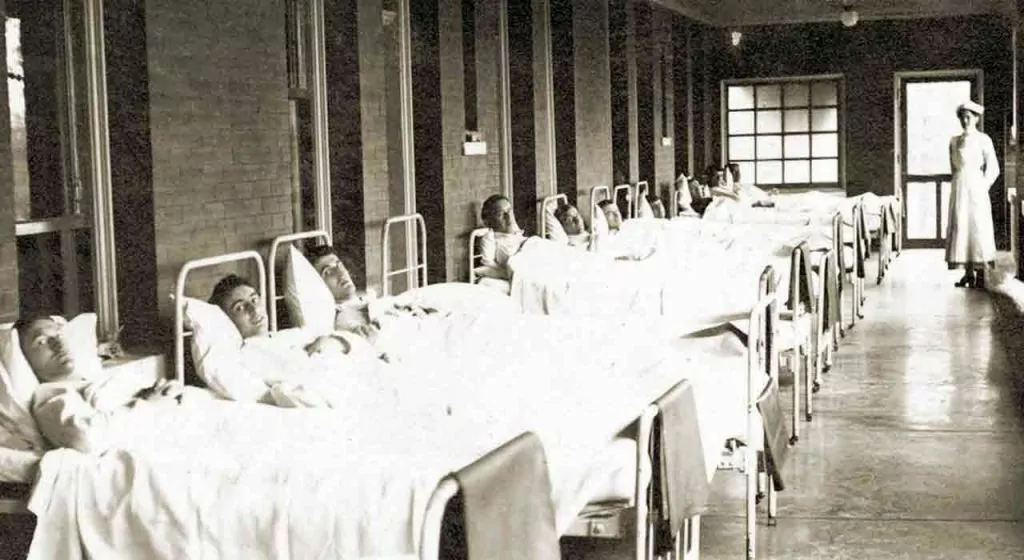A history of Healthcare...and why Christians have done it different
Within a short time span hospitals and medical care have greatly changed. In fact, today a man of seventy can justly claim that more medical progress has been made in his lifetime than in all of previous history.
This medical progress forces us to cope with issues our forefathers never faced. The most common and most pervasive issue is how new medical science has transformed medicine: it used to be about caring for a person; now it is about curing a disease. According to this new philosophy, when someone is faced with a medical problem, everything that can be done ought to be done, no matter what – they are treated as an object to be fixed, rather than a person to be helped.
That’s why it is important to understand the Christian origin of hospitals, and the Christian view on healthcare. We have an important message to share with the world. We can show them what true compassion is about.
HEALTHCARE MENTIONED IN THE BIBLE
The medical profession is an old one, and physicians were unquestionably a visible part of society in Bible times.
Scripture refers to the medical practice both favorably and disdainfully. Job gives a passing reference to doctors when he refers to his comforters as "worthless physicians" (Job 13:4). Charlatans, magicians, and witchdoctors were to be driven from society and avoided at all costs (Lev. 19:31; Deut. 18:10). However, doctors like Luke (the author of Luke and Acts) were respected men (Col. 4:14).
In the New Testament, Jesus is the Great Physician. He was concerned not only with humanity's spiritual condition but also with its physical state. He did not teach that we should accept suffering stoically; He saw it as an enemy which must be fought.
He was also involved in the lives of people who were in a situation of distress. All four Gospels reveal that, along with his teaching, He healed many. He showed compassion to the multitudes (Mark 8:2) healing the sick, opening the eyes of the blind, and making the lame walk, and the deaf to hear. When Jesus healed a woman on the Sabbath, his reply to the criticism was: "Should this woman... not be set free in the Sabbath day from what bound her?" (Luke 13:16).
Jesus expected his disciples, along with their teaching, to also heal: "He sent them out to preach the kingdom of God and to heal the sick" (Luke 9:2). He told his disciples when they looked after the sick, they were caring for Him (Matt. 25:36).
HEALTHCARE IN THE EARLY CHURCH
This exhortation of our Lord did not go unheeded. And as the early Christians were dispersed throughout Asia Minor, largely as a result of being persecuted, we find them engaged in healing in addition to their preaching and teaching. History shows that these early Christians did not only oppose abortion, infanticide, and the abandonment of infants, but they also nurtured and cared for the sick, regardless of who they were. Christian or pagan, it made no difference to them.
Bishop Dionysius (approximately 200-265 AD) tells us that Christians, when it came to caring for the sick and dying, ignored danger to themselves:
"Very many of our brethren, while in their exceeding love and brotherly kindness, did not spare themselves, but... visited the sick without thought of their own peril... drawing upon themselves their neighbors' diseases, and willingly taking over to their own persons the burden of the sufferings around them."
HEALTHCARE IN PAGAN GREECE AND ROME
The world the Christians entered during the Greco-Roman era had a colossal void with respect to caring for the sick and dying. The Greeks built large temples in honor of their numerous gods and goddesses, fashioned statues of all sorts, and wrote a wide variety of illuminating literature but never built any hospitals.
The Romans were subject to most of the same illnesses and ailments which afflict us today but diseases which are minor problems today were often life-threatening then. Because cure rates were low, they distrusted doctors or even scorned them. And their skepticism is easily understood. Anyone could call himself a doctor – there were no licensing boards and no formal requirements for entrance to the profession. The Roman scholar Pliny the Elder (23-79 AD) said:
"Medicine is the only profession, by Jove, where any man of the street gains our immediate trust if he professes to be a doctor; and yet surely no lie would be more dangerous. But we don't worry about that; each one is lulled by the sweet hope of being healed."
The key difference between the early Christians’ attitude toward the sick and the Greco-Roman attitude is their conflicting worldviews. The American church historian Philip Schaff summed it up well when he said, "The old Roman world was a world without charity."
Dionysius vividly described the behavior of non-Christians toward their fellow sick human beings in an Alexandrian plague in about AD 250. The pagans, he said:
"thrust aside anyone who began to be sick, and kept aloof even from their dearest friends, and cast the sufferers out upon the public roads half dead, and left them unburied, and treated them with utter contempt when they died."
No wonder the pagan world took note when the early Christians appeared on the scene and started caring for the sick and dying.
THE HISTORY OF HOSPITALS
Hospitals in the Western world owe their existence to Christian teachings and Christian culture. Charity hospitals for the poor did not exist until Christians founded them – these Christian hospitals were the world's first voluntary charitable institutions. Out of compassion for the sick and suffering, Christians felt that something ought to be done.
It is very important that we should keep this point before us. Secularism, which has such a negative and condescending attitude toward Christianity, should be reminded of this history.
The first ecumenical council of Nicea in 325 AD directed bishops to establish hospices/hospitals. Although their most important function was to nurse and heal the sick, they also provided shelter for the poor and lodging for Christian pilgrims. They were prompted by the early apostolic admonition by Christ's command that Christians be hospitable to strangers and travelers (1 Pet. 4:9).
The first hospital was built by St. Basil in Caesarea on Cappadocia about 369 AD. It was one of a "large number of buildings with houses for physicians and nurses, workshops, and industrial schools." The rehabilitation units gave those with no occupational skills the opportunity to learn a trade while recuperating. Deaconesses worked as nurses, visited the sick and the poor, and contacted pastors for spiritual care when deemed necessary. Christians searched for the sick in the city, and the latter were brought to the hospital.
In about 390, Fabiola, a wealthy widow and associate of St. Jerome (347-419 AD), built the first hospital in Western Europe, in the city of Rome.
By the sixth century, hospitals had become independent of bishops and were linked with monasteries. For many monasteries, the hospital was as much an essential part of the complex as a dining room, sleeping quarters, and the church. Monasteries without a hospital usually had an infirmary and herb garden which also enabled them to tend to their sick brethren and members of the general public. The love for Christ was their motivation. "Care of the sick," states the Rule of St. Benedict, who founded the great Benedictine Order in 527, "is to be placed above... every other duty, as if indeed Christ was being directly served by waiting on them."
In our time when so much is said about the "glorious past of Islam," it is interesting to note the impact of Christianity upon Islam's health care. In Under the Influence: How Christianity Transformed Civilization Alvin J. Schmidt observes that nearly four hundred years after Christians began erecting hospitals, the practice drew the attention of the Arabs in the 8th century. Impressed with the humanitarian work of Christian hospitals, the Arab Muslims began constructing hospitals in Arab countries. This demonstrates once more that Christianity was a major catalyst in changing the world, even beyond the boundaries of the West.
In the course of time Christian hospitals were founded in many countries across the world. I will mention only a few.
St. Bartholomew's, the oldest British hospital, was started in 1123 by Rahere, Court Jester to Henry I, when he founded a religious order.
St. Thomas's Hospital, the second oldest, was opened in 1213 by Richard, Prior of Bermondsey, against the wall of his monastery. Most of the work was performed by monks and nuns.
In 1524 Hernando Cortes, the Conquistador, founded Jesus of Nazareth Hospital in Mexico City, which is still operative today.
As early as 1639 Ursuline nuns established a hospital for French colonists in Quebec.
In 1801 there were only two hospitals in the United States. The one in Philadelphia was founded by the Quakers in the first half of the 1700s.
NURSING
When Christians introduced hospitals, it was, of course, necessary that the sick be nursed. But little is known about those who first took on the nursing role. Most of the evidence, though sparse, indicates that widows and deaconesses commonly served as nurses in early Christian hospitals. They can be compared to social workers and home care nurses of today. Paula (347-404), a female associate of St. Jerome, was essentially a nurse. But in 533 the Synod of Orleans abolished the office of the deaconess and her functions were taken over by the monastic orders.
In the 12th century, the Knights Hospitalers of St. John, a military order of the Crusaders, recruited women to serve as nurses to care for leprosy patients in Jerusalem. The physician and medical historian Fielding Garrison once remarked,
"The chief glory of medieval medicine was undoubtedly in the organization of hospitals and sick nursing, which had its organization in the teaching of Christ."
In 1822 a young German pastor, Theodor Fliedner in Kaiserwerth, tried to revive the function of deaconesses by recruiting women from the middle and upper classes who were willing to work with the spirit of Christian sacrificial love. They were carefully selected and trained. This ministry led to the establishment of deaconesses hospitals, which provided spiritual and physical treatment for the whole person. When Fliedner died in 1864, thirty-two Deaconesses' houses and 1,600 Deaconesses were spread throughout Germany, Asia Minor, and the USA.
Florence Nightingale, the "Lady of the Lamp," making her rounds at night.
Florence Nightingale (1820-1910), known as "the Lady of the Lamp" became a reformer of hospitals and the founder of modern nursing. Her interest in medical matters horrified her mother, who frustrated her attempts to gain nursing experience at Salisbury Hospital in 1844. Nevertheless, although nursing was considered unsuitable for a woman of respectability, she spent three months at Kaiserwerth in 1853. In the same year she visited the Sisters of Charity in Paris. These visits made a deep impression on her.
She became famous for her work in the 1854 Crimean war. She was invited by the British government to take a team of nurses to aid wounded and soldiers. She selected thirty-eight middle-aged nurses from several religious orders and included eight who had nursed cholera cases in the Plymouth slums. This small number of willing workers were sent to the huge base hospital at Scutari across the Bosporous from Constantinople. To this hospital came boatloads of sick and wounded. The conditions in this military hospital, which was no more than a collection of dirty barracks lacking all medical equipment, defies description. But with scant resources, Nightingale and her assistants did their utmost to change the awful unsanitary conditions for the better. Nightingale developed new treatments, made ward rounds daily, even if it meant being 20 hours on her feet. The stricken soldiers – upwards of 5,000 at one time – soon regarded her as a saint, an angel sent to save their lives.
Upon her return from the Crimean War in 1856 she became a national hero and an authority on hospital care. The money the grateful nation gave to her was mainly used to found a school for nurses in the St. Thomas Hospital in London. Her Notes on Hospitals published in 1859, were widely read, as were her Notes on Nursing, published the same year. The two books recommended better sanitation, construction, and management of hospitals. Her prime aim in life was to secure the effective training of nurses. By the 1880s and the 1890s nursing had established itself as a suitable and respected career.
WHY DID CHRISTIANS TREAT THE SICK DIFFERENTLY?
So it was clear Christians treated the sick differently… but why? There are two reasons.
1. IMAGE BEARERS OF GOD
The way doctors answer one key question will have a large impact on how they approach medical care. The question is: Who are we? Or, What is Mankind?
Secularists see people as things, maybe treasured things but things nevertheless. They don’t regard man as having an eternal destiny. They value people in terms of status and productivity, good looks, credentials, income and wealth.
But we are not merely animals, objects, consumers, or spirits. God's attitude about the value of a human being is far different from that seen in the secular world. Each human being is precious in God's sight.
After the fall into sin, man has not ceased to be man. We are still God's representatives in his world. We are made in his image (Gen.1:26; 1 Cor. 11:7; James 3:9). The high view God has of human beings is clearly demonstrated through his Son's Incarnation. His Son became one of us, but without sin. Furthermore, in contrast to the view of the secular and pagan world, our Lord's teaching provides a clear picture of our value in God's sight (Matt. 6:26; 12:12). In fact, the cross of Christ is the ultimate proof of the value of mankind (Mark 10:45).
The Bible also teaches the importance of the unity of body and soul. We may never separate the soul from the body. We may not say, "winning souls for Christ is more important than the ministry of healing." We love the whole man, not just his soul. Man is a unity of soul and body, indivisible, and this is also true for the medical patient. The body is not a neutral thing. Paul set it firmly in place as a "temple of the Holy Spirit." (1 Cor. 6:19). The body belongs to the Lord. To treat it as an object for medical experiments is sacrilegious. It will also have a dehumanizing effect on the patient.
The Christian worldview leads us to see the sick and distressed from a totally different perspective. Therefore, it is not strange that the commands of love taught in the Scriptures make Christians concerned about the whole man in all of his dimensions.
2. LOVE
The atheist British philosopher Bertrand Russell, famous for his book Why I Am Not a Christian, later wrote, "What the world needs is Christian love or compassion." I am sure Christians agree with his observation.
But to show Christian love is easier said than practiced. How can we love those who persecute or hate us? The love standard revealed in Scripture goes against our human nature.
What is love? True love is from God: "Love is of God, and he who loves is born of God" (1 John 4:7). Consequently, we are the instruments of God's love (2 Cor. 5:14). Our helping someone in need is the same as helping the Lord Himself (Matt. 25:40).
How did the early Christians view love? The Church father St. Augustine had much to say about love, but it had nothing of that oozing, sentimental, sensual feeling promoted by our modern culture. He observed that love is always preferential; it gives of itself voluntarily, not because the giving is legally due another. What is not loved for its own sake and its own right is not actually loved at all. Love, or compassion, is a relationship between persons. But love is not limited to one's friends. Love is desiring and doing the good of the other (1 Cor. 13:4-7). It is self-sacrificing for the other. Jesus said, "Love your neighbor as yourself" (Matt. 22:39). Our neighbors are people in need, whoever they are and wherever they may be. For example, Jonah discovered that even the wicked Assyrians were his neighbors (4:2).
So Christians treat the sick differently because we recognize them as being made in God’s image, and because we have been instructed to seek after the good of our neighbor.
CONCLUSION
The Christian origins of hospitals and the nursing profession seem almost forgotten. But the precedent the early Christian hospitals set not only alleviated human suffering but also extended the lives of multitudes of people, whether rich or poor. These institutions did not treat patients as objects. They reflected Christ's love for the whole person.
In our technological age, the Biblical concept of love is lacking more and more in the medical sector, and unfortunately also in the caregivers. That's why the Christian perspective on healthcare has an important message for today. Love is concerned about the whole man with all of his needs. The hungry need food. The sick need to be healed (James 5:14). The lost need to be told the Gospel. Today's Christian healthcare giver has a great responsibility. Going against the flow, he/she is called to offer priestly and prophetic healthcare.
Rev. Johan Tangelder (1936-2009) wrote for Reformed Perspective for 13 years. Many of his articles have been collected at Reformed Reflections. This article first appeared in the July/August 2007 issue....













